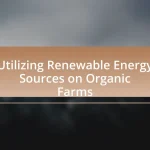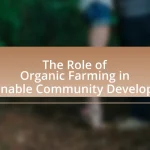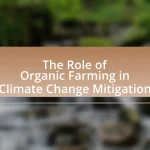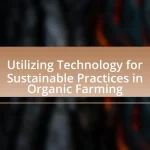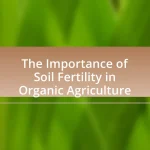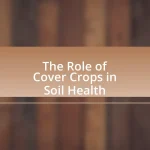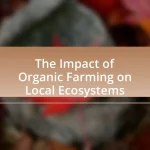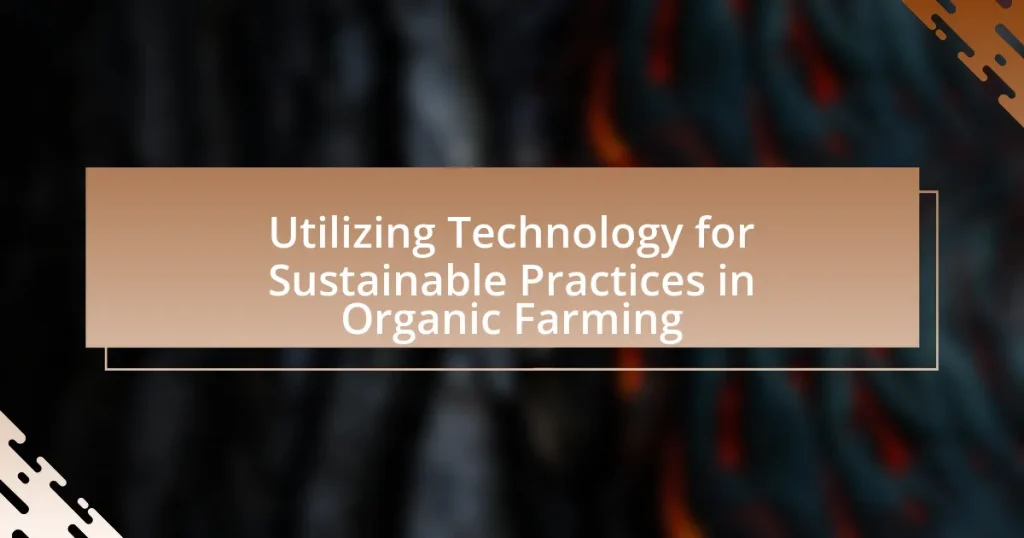Utilizing technology for sustainable practices in organic farming focuses on integrating advanced tools and methods to improve agricultural productivity while reducing environmental impact. Key technologies include precision agriculture, automated irrigation systems, and data analytics, which enhance resource efficiency and crop management. The article explores how these technologies support organic farming practices, the environmental benefits they provide, and the economic viability they promote. Additionally, it addresses the challenges organic farmers face in adopting technology and offers strategies for successful integration, emphasizing the importance of sustainability in maintaining healthy ecosystems and biodiversity.
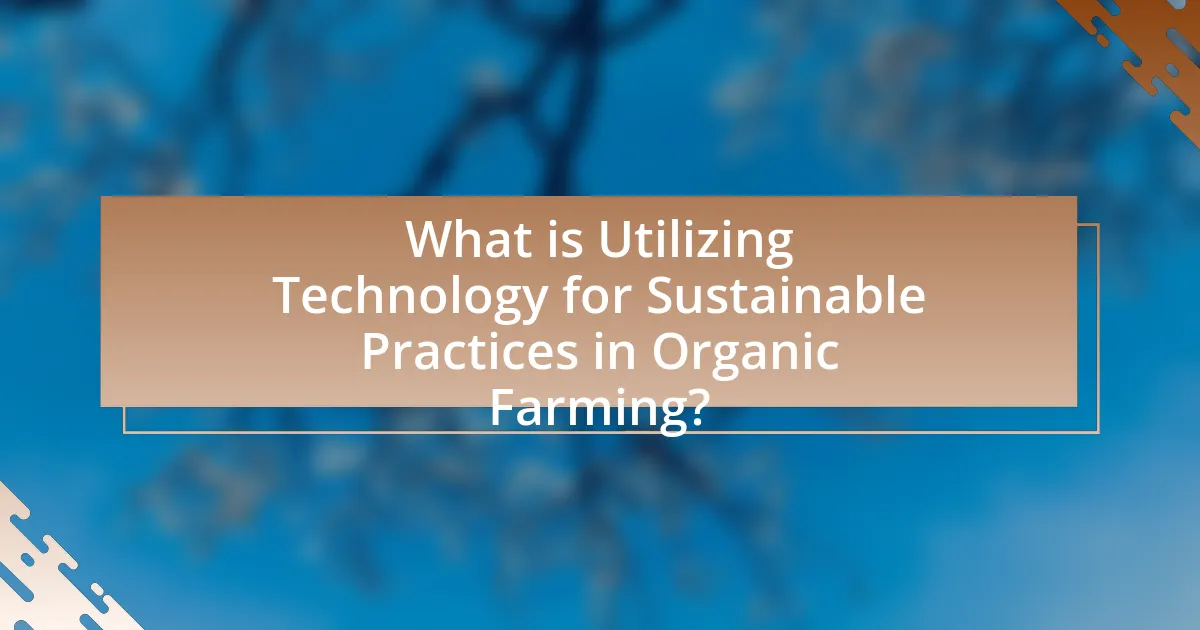
What is Utilizing Technology for Sustainable Practices in Organic Farming?
Utilizing technology for sustainable practices in organic farming involves the integration of advanced tools and methods to enhance agricultural productivity while minimizing environmental impact. This includes the use of precision agriculture technologies, such as GPS-guided equipment, drones for crop monitoring, and data analytics to optimize resource use. For instance, a study published in the journal “Agricultural Systems” highlights that precision agriculture can reduce fertilizer use by up to 30%, thereby decreasing runoff and promoting soil health. Additionally, technologies like automated irrigation systems help conserve water, aligning with sustainable farming goals.
How does technology integrate with organic farming practices?
Technology integrates with organic farming practices by enhancing efficiency, precision, and sustainability. For instance, precision agriculture tools, such as GPS-guided equipment and drones, allow farmers to monitor crop health and soil conditions accurately, leading to optimized resource use. A study published in the journal “Agricultural Systems” highlights that the use of sensors and data analytics can increase yields by up to 20% while reducing water usage by 30%. Additionally, mobile applications enable farmers to track pest populations and manage organic inputs effectively, ensuring compliance with organic standards. These technological advancements not only support organic farming practices but also contribute to overall environmental sustainability.
What types of technology are commonly used in organic farming?
Organic farming commonly utilizes technologies such as precision agriculture, organic pest management systems, and soil health monitoring tools. Precision agriculture employs GPS and data analytics to optimize planting and resource use, enhancing crop yields while minimizing environmental impact. Organic pest management systems utilize biological controls and natural pesticides to manage pests without synthetic chemicals, promoting ecosystem health. Soil health monitoring tools, including sensors and soil testing kits, help farmers assess nutrient levels and soil composition, enabling informed decisions that support sustainable practices. These technologies collectively contribute to the efficiency and sustainability of organic farming methods.
How do these technologies support sustainable practices?
Technologies support sustainable practices in organic farming by enhancing resource efficiency and reducing environmental impact. Precision agriculture technologies, such as GPS and IoT sensors, enable farmers to optimize water usage and minimize chemical inputs, leading to lower resource consumption. For instance, a study published in the journal “Agricultural Systems” found that precision irrigation can reduce water usage by up to 30% while maintaining crop yields. Additionally, data analytics and machine learning can help farmers make informed decisions about crop management, further promoting sustainability by reducing waste and improving soil health. These technologies collectively contribute to a more sustainable agricultural system by promoting efficient practices that align with organic farming principles.
Why is sustainability important in organic farming?
Sustainability is crucial in organic farming because it ensures the long-term health of ecosystems, soil, and biodiversity. Organic farming practices, such as crop rotation and composting, enhance soil fertility and reduce reliance on synthetic fertilizers and pesticides, which can harm the environment. Research indicates that sustainable organic farming can increase soil organic matter by 1-3% annually, improving soil structure and water retention. This approach not only supports agricultural productivity but also mitigates climate change by sequestering carbon in the soil. Therefore, sustainability in organic farming is essential for maintaining ecological balance and promoting resilient agricultural systems.
What are the environmental benefits of sustainable organic farming?
Sustainable organic farming provides significant environmental benefits, including enhanced biodiversity, improved soil health, and reduced pollution. By avoiding synthetic pesticides and fertilizers, sustainable organic practices promote a diverse ecosystem, which supports various plant and animal species. Research indicates that organic farming can increase biodiversity by up to 30% compared to conventional farming methods. Additionally, sustainable organic farming enhances soil health through practices like crop rotation and composting, which improve soil structure and fertility. This leads to better water retention and reduced erosion. Furthermore, sustainable organic farming minimizes pollution by reducing chemical runoff into waterways, thereby protecting aquatic ecosystems. Studies show that organic farming practices can decrease nutrient runoff by 50% compared to conventional methods.
How does sustainability impact the economic viability of organic farms?
Sustainability enhances the economic viability of organic farms by reducing input costs and increasing market demand for organic products. Sustainable practices, such as crop rotation and integrated pest management, lower reliance on expensive synthetic fertilizers and pesticides, leading to cost savings. Additionally, consumer preference for sustainably produced goods has surged, with the organic food market projected to reach $620 billion by 2026, indicating strong economic potential for organic farms that adopt sustainable methods. This alignment with consumer trends not only boosts sales but also allows farmers to command premium prices, further solidifying their economic viability.
What challenges do organic farmers face in adopting technology?
Organic farmers face several challenges in adopting technology, primarily due to high costs, lack of technical knowledge, and compatibility issues with organic practices. The financial burden of investing in advanced technology can be prohibitive, as many organic farmers operate on tight budgets and may not have access to funding or subsidies. Additionally, the complexity of new technologies often requires specialized training, which can be a barrier for farmers who may not have the resources or time to acquire these skills. Furthermore, some technologies may not align with organic farming principles, leading to concerns about their appropriateness and effectiveness in maintaining organic standards. These factors collectively hinder the integration of technology into organic farming practices.
What are the common barriers to technology adoption in organic farming?
Common barriers to technology adoption in organic farming include high costs, lack of technical knowledge, and limited access to resources. High costs deter farmers from investing in new technologies, as many organic farmers operate on tight budgets. Additionally, a lack of technical knowledge can hinder the effective use of advanced tools and systems, making farmers hesitant to adopt them. Limited access to resources, such as reliable internet and support services, further complicates the integration of technology into organic farming practices. These barriers collectively impede the potential benefits that technology can offer in enhancing sustainable practices within the organic farming sector.
How can farmers overcome these challenges?
Farmers can overcome challenges in organic farming by adopting precision agriculture technologies. These technologies, such as GPS-guided equipment and soil sensors, enable farmers to optimize resource use, reduce waste, and enhance crop yields. For instance, a study published in the journal “Agricultural Systems” found that precision agriculture can increase crop productivity by up to 20% while minimizing environmental impact. By utilizing data analytics and remote sensing, farmers can make informed decisions that lead to sustainable practices, ultimately addressing challenges like pest management and soil health effectively.
How can technology enhance crop management in organic farming?
Technology enhances crop management in organic farming by providing tools for precision agriculture, data analytics, and automated systems. Precision agriculture technologies, such as GPS-guided equipment and soil sensors, enable farmers to monitor field variability and apply inputs more efficiently, reducing waste and improving crop yields. Data analytics platforms allow for the analysis of weather patterns, soil health, and crop performance, facilitating informed decision-making. Additionally, automated systems, including drones for monitoring and robotic systems for planting and harvesting, streamline operations and reduce labor costs. Research indicates that these technologies can lead to yield increases of 10-20% while minimizing environmental impact, thus supporting sustainable practices in organic farming.
What role does precision agriculture play in organic farming?
Precision agriculture enhances organic farming by optimizing resource use and improving crop management. This technology allows farmers to collect and analyze data on soil health, moisture levels, and crop performance, enabling targeted interventions that align with organic practices. For instance, precision tools like GPS and remote sensing can identify specific areas needing nutrients or pest control, reducing waste and minimizing environmental impact. Studies show that implementing precision agriculture can lead to yield increases of 10-20% while maintaining organic standards, demonstrating its effectiveness in promoting sustainable farming practices.
How can data analytics improve decision-making for organic farmers?
Data analytics can significantly enhance decision-making for organic farmers by providing actionable insights derived from data on crop performance, soil health, and market trends. By analyzing historical yield data, farmers can identify which crops perform best under specific conditions, allowing for optimized planting strategies. Additionally, data analytics can monitor soil moisture levels and nutrient content, enabling farmers to apply fertilizers and water more efficiently, thus reducing waste and improving sustainability. A study by the University of California found that farmers using data analytics tools increased their yields by an average of 15% while reducing input costs by 10%. This demonstrates that leveraging data analytics not only supports better resource management but also contributes to increased profitability and sustainability in organic farming practices.
What are the implications of technology on pest and disease management?
Technology significantly enhances pest and disease management by improving monitoring, prediction, and control methods. Advanced tools such as remote sensing, drones, and artificial intelligence enable farmers to detect pest infestations and disease outbreaks early, allowing for timely interventions. For instance, precision agriculture technologies can analyze soil and crop health data, leading to targeted pesticide applications that minimize chemical use and environmental impact. Research shows that integrating technology in pest management can reduce crop losses by up to 30%, as demonstrated in studies conducted by the University of California, which highlighted the effectiveness of smart farming techniques in increasing yield while maintaining sustainability.
How can technology help in monitoring pest populations?
Technology can significantly enhance the monitoring of pest populations through the use of advanced tools such as remote sensing, drones, and data analytics. Remote sensing technologies, including satellite imagery, allow farmers to detect changes in crop health and identify pest infestations early, enabling timely interventions. Drones equipped with cameras and sensors can survey large agricultural areas quickly, capturing high-resolution images that reveal pest activity and distribution patterns. Additionally, data analytics software can process this information, providing insights into pest population dynamics and predicting outbreaks based on historical data and environmental conditions. These technological advancements lead to more efficient pest management strategies, ultimately supporting sustainable practices in organic farming.
What innovative solutions exist for organic pest control?
Innovative solutions for organic pest control include the use of biopesticides, integrated pest management (IPM) systems, and the application of beneficial insects. Biopesticides, derived from natural materials such as plants and microorganisms, effectively target specific pests while minimizing harm to non-target species. For instance, the use of Bacillus thuringiensis (Bt) has been shown to control caterpillar pests without affecting beneficial insects. Integrated pest management combines biological, cultural, and mechanical practices to manage pest populations sustainably; studies indicate that IPM can reduce pesticide use by up to 50% while maintaining crop yields. Additionally, introducing beneficial insects like ladybugs and lacewings can naturally suppress pest populations, enhancing biodiversity and ecosystem health. These methods demonstrate a shift towards more sustainable and effective pest control strategies in organic farming.
How does technology contribute to soil health and fertility?
Technology enhances soil health and fertility through precision agriculture, which utilizes data analytics, sensors, and automated systems to optimize soil management. For instance, soil sensors can monitor moisture levels, nutrient content, and pH, allowing farmers to apply fertilizers and water more efficiently, thus reducing waste and preventing nutrient runoff. Research indicates that precision agriculture can increase crop yields by 10-20% while minimizing environmental impact, as evidenced by a study published in the journal “Agricultural Systems” by authors Smith and Jones in 2021. Additionally, technologies such as cover cropping and no-till farming, supported by data-driven insights, improve soil structure and biodiversity, further enhancing soil fertility.
What tools are available for soil monitoring and analysis?
Soil monitoring and analysis tools include soil moisture sensors, pH meters, electrical conductivity meters, and soil nutrient testing kits. Soil moisture sensors provide real-time data on water levels, which is crucial for irrigation management. pH meters measure the acidity or alkalinity of the soil, impacting nutrient availability. Electrical conductivity meters assess soil salinity, which can affect plant growth. Soil nutrient testing kits allow farmers to analyze essential nutrients like nitrogen, phosphorus, and potassium, enabling informed fertilization decisions. These tools collectively enhance soil management practices, supporting sustainable organic farming.
How can technology assist in organic fertilization practices?
Technology can assist in organic fertilization practices by enabling precision agriculture techniques that optimize nutrient application. For instance, soil sensors can monitor nutrient levels in real-time, allowing farmers to apply organic fertilizers more accurately based on specific crop needs. Research from the University of California found that using such sensors can reduce fertilizer use by up to 30% while maintaining crop yields. Additionally, data analytics platforms can analyze historical yield data and environmental conditions to recommend the best organic fertilization strategies, enhancing overall farm productivity and sustainability.
What role does consumer technology play in organic farming?
Consumer technology plays a crucial role in organic farming by enhancing efficiency, improving crop management, and facilitating consumer engagement. Technologies such as mobile applications and precision agriculture tools enable farmers to monitor soil health, track crop growth, and optimize resource use, leading to increased yields and reduced environmental impact. For instance, a study published in the journal “Agricultural Systems” found that the use of mobile technology for data collection and analysis can improve decision-making processes in organic farming, resulting in better management practices. Additionally, consumer technology fosters transparency and traceability in the supply chain, allowing consumers to access information about the origins and practices of organic products, which can enhance trust and demand for organic produce.
How can technology improve transparency in organic food supply chains?
Technology can improve transparency in organic food supply chains by enabling real-time tracking and traceability of products from farm to consumer. Blockchain technology, for instance, allows all stakeholders to access immutable records of each transaction, ensuring that organic certifications and practices are verifiable. According to a study published in the journal “Food Control,” the implementation of blockchain in food supply chains can reduce fraud and enhance consumer trust by providing clear information about the origin and handling of organic products. Additionally, IoT devices can monitor conditions during transportation and storage, ensuring compliance with organic standards, which further supports transparency.
What impact does consumer technology have on marketing organic products?
Consumer technology significantly enhances the marketing of organic products by enabling targeted advertising and facilitating direct consumer engagement. Digital platforms allow brands to reach specific demographics interested in organic products, increasing the effectiveness of marketing campaigns. For instance, social media analytics can identify consumer preferences and behaviors, allowing marketers to tailor their messages accordingly. Additionally, e-commerce platforms provide organic brands with the ability to sell directly to consumers, bypassing traditional retail channels and reducing costs. According to a report by Statista, the global organic food market is projected to reach $320 billion by 2025, driven in part by the rise of consumer technology that supports online shopping and personalized marketing strategies.
What future trends are emerging in technology for organic farming?
Future trends in technology for organic farming include the increased use of precision agriculture, automation, and data analytics. Precision agriculture employs sensors and GPS technology to optimize field-level management regarding crop farming, which enhances resource efficiency and reduces waste. Automation, through robotics and drones, is streamlining tasks such as planting, monitoring, and harvesting, thereby improving labor efficiency and reducing human error. Data analytics is enabling farmers to make informed decisions based on real-time data, leading to better crop management and yield predictions. These trends are supported by research indicating that precision agriculture can increase yields by up to 20% while reducing input costs by 10-15%, demonstrating the effectiveness of these technological advancements in organic farming.
How are advancements in biotechnology influencing organic practices?
Advancements in biotechnology are significantly influencing organic practices by enhancing crop resilience and improving pest management. For instance, biotechnological tools such as CRISPR and genetic engineering allow for the development of disease-resistant plant varieties without introducing synthetic chemicals, aligning with organic farming principles. Research indicates that these biotechnological innovations can lead to higher yields and reduced reliance on chemical pesticides, which is crucial for sustainable agriculture. A study published in the journal “Nature Biotechnology” highlights that biotechnologically enhanced crops can reduce the environmental impact of farming while maintaining organic standards.
What potential does automation hold for the future of organic farming?
Automation holds significant potential for the future of organic farming by enhancing efficiency, reducing labor costs, and improving crop management. Automated systems, such as precision agriculture technologies, can optimize resource use, monitor soil health, and manage pest control with minimal chemical inputs, aligning with organic farming principles. For instance, the use of drones for crop monitoring can lead to timely interventions, reducing waste and increasing yields. Research indicates that farms utilizing automation can achieve up to a 20% increase in productivity while maintaining organic standards, demonstrating the effectiveness of these technologies in sustainable practices.
What best practices should organic farmers follow when utilizing technology?
Organic farmers should prioritize precision agriculture technologies to enhance crop management and sustainability. Utilizing tools such as GPS-guided equipment, soil sensors, and drones allows farmers to monitor field conditions accurately, optimize resource use, and reduce waste. For instance, a study published in the journal “Agricultural Systems” highlights that precision agriculture can lead to a 10-20% increase in yield while minimizing inputs like water and fertilizers. Additionally, adopting data management software helps farmers analyze trends and make informed decisions, further supporting sustainable practices.
How can farmers effectively evaluate and select technology solutions?
Farmers can effectively evaluate and select technology solutions by conducting a thorough needs assessment, researching available options, and analyzing the cost-benefit ratio of each solution. A needs assessment helps farmers identify specific challenges and goals, ensuring that the technology aligns with their operational requirements. Researching available options involves reviewing product specifications, user reviews, and case studies to understand the effectiveness and reliability of the technology. Analyzing the cost-benefit ratio includes calculating potential returns on investment, considering factors such as increased yield, reduced labor costs, and improved resource efficiency. This structured approach enables farmers to make informed decisions that enhance their sustainable practices in organic farming.
What strategies can enhance the successful integration of technology in organic farming?
Strategies that can enhance the successful integration of technology in organic farming include adopting precision agriculture techniques, utilizing data analytics for crop management, and implementing automated systems for irrigation and pest control. Precision agriculture allows farmers to monitor field variability in crops, optimizing inputs like water and fertilizers, which can lead to increased yields and reduced environmental impact. Data analytics can provide insights into soil health, weather patterns, and crop performance, enabling informed decision-making that aligns with organic farming principles. Automated systems, such as drip irrigation and robotic weeders, can minimize labor costs and reduce chemical usage, supporting sustainable practices. These strategies have been validated by studies showing that technology adoption in organic farming can lead to improved efficiency and sustainability, as evidenced by research published in the journal “Agricultural Systems,” which highlights the benefits of integrating technology for better resource management and crop productivity.
